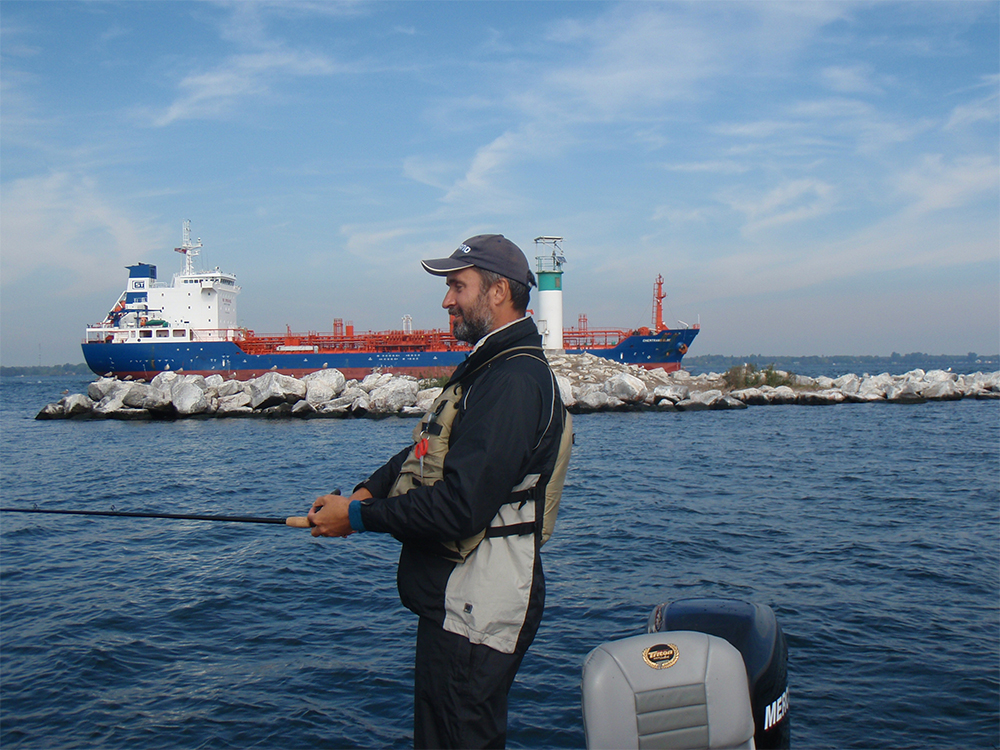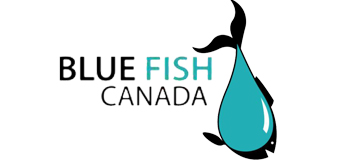Blue Fish News – June 14, 2020
In the June 14, 2020 issue of the Blue Fish Canada News we dive into the Great Lakes and explore what’s good, what’s not good, and what’s being done about it. As always, the news includes links to timely fishing, fish health, water quality and other fishing related articles, and more about our Blue Fish Steward Quiz along with details of the prizes totaling over $750 in value!

This Week’s Feature:
Ever wonder why recreational fishing harvest regulations and fish consumption advisories don’t always mesh up? Or why different government organizations issue conflicting advisories concerning the same fish from the same body of water? Want to no more about why fishing advisories are issued in the first place, or what makes advisories necessary in the first place? As well, Fish move around, as does the water in the great lakes, so why do we have different advisories for the same species of fish based on some invisible line on the water? I and many other recreational anglers and indigenous fishers have been asking these questions and others for decades, and all the time wondering just who to believe.
For several years now I’ve been part of a process called the “Healthy Great Lakes Initiative” organized by the Canadian Environmental Law Association. They understand that water quality issues in the Great Lakes Basin and Upper St. Lawrence River includes fish health. With their support, I conducted a stakeholder consultation that explored Great Lakes and St. Lawrence fish health issues including speaking with people including recreational and indigenous fishing, the fishing and boating industry, conservation groups, government officials and the scientific community. They all agreed that not only is non-commercial fishing a valuable economic contributor valued at over $8-Billion annually, but an important part of the social fabric of both indigenous and non-indigenous shoreline communities. A number of recommendations came out of the process, which I’m pleased to report are beginning to be acted upon. You can read the report for yourself here: https://bluefishcanada.ca/resources/fish-health/
Mark Mattson is a lawyer and the Waterkeeper for Lake Ontario. Mark’s been advocating for more responsible ways to release sewage into our ecosystems. No doubt, the untreated sewage that is routinely released into the Great Lakes and associated watersheds each time there’s a significant rainfall is one problem. Another is the harmful chemical and other toxins that end up passing through sewage treatment plants and being released into the lakes and rivers each day. Link below to hear my conversation with Mark Mattson of Swim Drink Fish Canada on Blue Fish Radio: https://bluefishradio.com/sewage-continues-to-pose-problems-for-fishability/
The Great lakes and St. Lawrence Collaborative recently wrapped up their own consultations in which they explored issues such as addressing shoreline erosion, outdated infrastructure, invasive species, exposure to toxins, and beach contamination. The Collaborative recently released their final Action Plan calling for a $2.2 Billion investment by Canada that would result in ecological, public health, economic, and lifestyle benefits. One of the five organizations participating on the Collaborative was the Great Lakes Fisheries Commission, responsible for overseeing what is the most valuable freshwater commercial fishery in the world. I had a chance to speak with the Fisheries Commission’s Bob Lambe Executive Director and Marc Gaden Communications Director and Legislative Liaison to discuss how fish health factored into the work of the Colaborative on this episode of Blue Fish Radio: https://bluefishradio.com/great-lakes-and-st-lawrence-collaborative/
Mercury and PCB have been an issue with fish health and the source of numerous fish consumption advisories throughout the Great Lakes and St. Lawrence for decades. While many of these issues continue to this day, steps have also been taken to ensure further such contamination is prevented. Not so with a variety of new “forever” chemicals being released into the ecosystem by industry such as PFAS commonly found in products such as fire retardants and waterproofing agents. These are chemicals that biomass [accumulate] in fish and, if eaten by us, in humans as well. Worse, they are considered endocrine disruptors, or in other words, the cause of cancerous tumors, birth defects and other developmental disorders such as with the sex organs of juvenile fish. John Jackson, Co-Chair of the Binational Toxic-Free Great Lakes Network, is leading the charge in Canada to get chemicals such as PFAS listed as “chemicals of mutual concern”. John was my guest on the following episode of Blue Fish Radio: https://bluefishradio.com/great-lake-chemicals-of-mutual-concern/
Normand Peters is a Mohawk elder who has taken on the responsibility of educating the next generation of Mohawk of Akwesasne youth on their 10,000 years of fishing culture. Fears over consuming contaminated fish from the St. Lawrence has meant two generations of Mohawk people have lived along the river without catching and eating the fish. No wonder then it was the Mohawk that successfully pursued the companies that once dumped the chemicals into the river over decades of manufacturing along the its banks. The restoration work will be on-going for years. Blue Fish Radio was on hand to record the story of four Mohawk activists and now fishers who graduated from Normand’s outdoor education program: https://bluefishradio.com/restoring-the-st-lawrence-thanks-to-the-mohawks-of-akwesasne/
Finally, One of the recommendations concerning fish health getting underway is a new International Joint Commission initiative intended to explore fish consumption advisories of specific relevance to the Mohawk of Akwesasne. The goal is by working with the Mohawks, scientists and officials from both the Canadian and U.S. governments, we can begin to make sense of how advisories are formed and issued. Blue Fish Radio recently spoke with Dr. Laurie Chan, Canadian Co-Chair of the IJC initiative. Link below to hear how this first step will be used to inform a much broader process that will look at fish consumption advisories throughout the Great Lakes and St. Lawrence: https://bluefishradio.com/ijc-on-new-great-lakes-fish-health-advisory-committee/
The Latest Fishing, fish Health and Water Quality News
Fishing:
Renegade Bass Tour’s 2020 season will continue
To comply with Federal and Ontario health guidelines, a number of changes will be implemented. RBT competitors are not to participate in the tournament if they have had any Covid-19 symptoms within the last 14 days leading up to an event.
Fish Health:
Sockeye Salmon Back in Canadian Lake for First Time in Fifty Years! – Goodnet
Restoration efforts have successfully brought back thousands of sockeye salmon to British Columbia’s Okanagan Lake. Sockeye salmon were once native to this lake in British Columbia, Canada, although they had not been seen in it for five decades.
Goldfish are rapidly taking over this B.C. lake – CBC
Dumping a couple of unwanted pet goldfish in a lake may not sound like a big deal but two can quickly multiply. Pinecrest Lake, which is located about halfway between Squamish and Whistler, had no goldfish in its waters last year — but now they number in the hundreds, according to the Sea to Sky Invasive Species Council.
Atlantic Salmon Continue to Dwindle in Nova Scotia’s LaHave River – CBC
The Atlantic Salmon Federation calls on DFO to focus on restoration of Atlantic salmon in the LaHave River, instead of their current preoccupation with the St. Mary’s River in northeast Nova Scotia where Salmon populations are stable. The salmon advocates are asking for better support from government in areas where help is required.
Virus-infected salmon should not be sold – ASF
Nova Scotia salmon advocate raises concerns on the potential harm from distributing virus-infected salmon in areas not originally impacted. Advocates claim The Nova Scotia Department of Fisheries and Aquaculture’s decision to give a 20-year permit to Cooke Aquaculture to raise farmed salmon in Liverpool Bay is both devious and reckless.
‘Eyes the size of a coffee cup’: Rare deep-sea fish found near Port Angeles – KOMO
A paddle boarder made a discovery of an extremely rare fish near Port Angeles Sunday that has wildlife researchers buzzing. The ribbonfish, known as the King-of-Salmon, was found at the Salt Creek Recreation area. The fish typically live down around 3,000 feet deep along the Pacific Coast and up till now, only four or five had ever been spotted between Washington and British Columbia.M
Water Quality:
Pebble Mine Nears a Decision but Questions Surround its Environmental Review – Hakai Magazine
Documents unveiled by a Freedom of Information Act request show agencies’ behind-the-scenes critiques of the proposed Pebble Mine. The Pebble Limited Partnership (PLP) plans to build an open-pit mine in a largely undeveloped stretch of southwest Alaska to extract a fraction of what may be the world’s biggest unexploited deposit of copper and gold. The proposed site for the mine lies under two rivers that drain into Bristol Bay, home to one of the world’s most productive wild salmon fisheries.
Elephant in the room – liabilities of open-pit mining – The Narwhal
On April 17, with the energy industry in crisis, Prime Minister Justin Trudeau announced $1.7 billion in federal funding for cleaning up a long-festering environmental liability: orphan and inactive oil and gas wells. While it was viewed as a positive step to fix a growing problem, it also drew criticism for offloading the responsibilities of private corporations onto taxpayers. What about Alberta’s oil sands? The Alberta Energy Regulator says publicly that the liabilities of open-pit mining — the operations that produce tailings ponds — amount to $30 billion, though its internal estimates calculated a “worst-case scenario” of $130 billion. The province of Alberta has on hand less than $1 billion as the oil sands industry grapples with a declining market.
Lake Ontario Containment of 150-year-old toxic blob – The Narwhal
A $139-million underwater box the size of six city blocks is being built to contain an underwater contaminated zone in Hamilton’s Randle Reef for some 200 years. While critics point out the answer to the steel town’s historic pollution shouldn’t be found in making more steel, others say the technique should be considered for other toxic sites in Canadian waters
How a Yukon mine left behind a $35-million clean-up bill – The Narwhal
The Yukon Territorial government is on the hook to clean up the Wolverine mine after its owner went bankrupt. A system in place to secure funds for remediation throughout a mine’s life should have prevented this scenario, but it didn’t — and that doesn’t bode well for future mine clean-ups.
Indigenous:
Northern B.C. First Nations wrap up testimony in supreme court case against Rio Tinto (Alcan) – Prince George Matters
Saik’uz and Stellat’en First Nations launched legal action in BC Supreme Court in 2011 to save the Nechako River and its fisheries. The case centres around the impacts of the construction and operation of the Kenney Dam on the Nechako River and Saik’uz and Stellat’en’s constitutionally protected Aboriginal rights, including fisheries on the river.
Business:
Free Business Re-Opening Resource
A new free toolkit has been prepared by Destination Northern Ontario and Nature and Outdoor Tourism Ontario (NOTO). The toolkit is designed to provide guidance for business owners, operators, staff as well as customers.
Arts:
“Invader Crusader” Art Contest Winner Announced – Outdoor.Com
Wildlife Forever and Title Sponsor Bass Pro Shops, is proud to honor 7th grade, Pennsylvania artist, Tilden Abercrombie with the prestigious Invader Crusader award. The Invader Crusader award was created to spotlight the impact that invasive species have on fish and wildlife.
Blue Fish Steward Quiz
You already know how to catch fish, great, but are you the best angler you can be? Want to test your knowledge to see if you’re following the latest science-based best practices so released fish swim away healthy, and the fish stocks you harvest from are sustainable?
https://www.surveymonkey.com/r/C6FS5MQ
Be one of seven lucky anglers who will receive gifts from Ranger Boats, Shimano, Orleans Boat World, EagleClaw, Salus Marine, Scotty Fishing and Musky Factory Baits – gifts totaling over $750 in value.
Blue Fish Canada has assembled a series of short quizzes to test your knowledge about fishing sustainably. They go beyond fishing regulations, and test how well you know the latest best practices and proven technologies that safeguard the welfare of fish and their long-term sustainability.
Take the first quiz and gain access to Blue Fish Canada’s interactive on-line citizen science resources, and the tools to become a certified Blue Fish Canada Steward including free decals and the chance to sample the latest sustainable fishing gear.
https://www.surveymonkey.com/r/C6FS5MQ
Whether you’re new to fishing and you want to make sure you’re catching, releasing and harvesting fish sustainably, or you want to mentor those new to fishing using the best available science-based knowledge, Blue Fish Canada has the free resources you need to fish with confidence, connect with nature sustainably, and give back in meaningful ways.
About us
You can read current and back issues of Blue Fish Canada’s Newsletters by visiting: www.bluefishcanada.ca
For more about Lawrence Gunther, North America’s only blind professional angler, conservationist, writer, blogger, podcaster, film maker and TV personality, visit: www.lawrencegunther.com
Gunther founded the charity Blue Fish Canada in 2012 and launched the podcast Blue Fish Radio in 2013.
Please rate The Blue fish Radio Show on Apple Podcast so others will learn of this unique Canadian resource by visiting: https://podcasts.apple.com/us/podcast/the-blue-fish-radio-show/id1090189487?uo=4
Should you have a podcast suggestion or resource you would like to share, please send us a message to: admin@bluefishcanada.ca
Blue Fish Canada is a federally incorporated registered Canadian charity. Please consider making a small monthly donation to off-set the costs of this Newsletter and our other Blue Fish Canada programs by visiting: https://bluefishcanada.ca/donations/
 Blue Fish Canada/Poisson Bleu Canada
Blue Fish Canada/Poisson Bleu Canada
